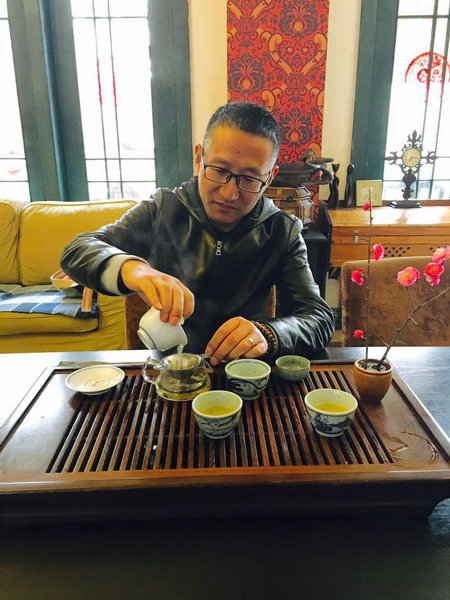A city which nurtures its traditions
Updated: 2016-02-19 08:46
By Mei Jia(China Daily)
|
||||||||
 |
|
Xiong Qiang runs a teahouse in his family compound in the suburb of Chengdu.[Photo provided to China Daily] |
On the seventh day of Lunar New Year, which fell on Sunday, residents of Chengdu gathered at Du Fu's Thatched Cottage in the city's Qingyang district to recite poems and celebrate.
The custom has been followed for decades, and Qing Dynasty writer Fu Chongju (1875-1917), a Chengdu native, recorded it in his book An Overview on Chengdu.
In a city where traditions are alive and valued, Xiong Qiang happily speaks about his family values passed down through generations.
"It's about being authentic and always having goodwill towards others," the 52-year-old owner of the mid-sized farmhouse resort says.
"My father, being a teacher, always tried to inculcate these values in his four children. They're deeply rooted in our minds," says Xiong.
Xiong and his wife, a teacher, manage their compound containing a teahouse and restaurant Mei Lu in the southeastern suburb's Sansheng Flower Town, and these are values they follow even today.
The flower town is known for its horticulture business, scenery, and numerous farmhouses that have been turned into resorts. They are representative of the city, which aims to develop its leisure economy.
"I'd rather tell customers in advance that we offer only a set menu and charge a little bit more, which might put them off, rather than offering low-quality food at a lower cost," he says, adding that customers often appreciate his being upfront and accept his way.
Xiong's 20-year-old son skipped university and is devoted to starting an IT business.
The father finally supported the son's decision after lots of contemplation.
"But I told him the same thing my father told me - be credible and be kind in all circumstances," he says.
Xiong says he believes that people are born nice and kind, even despite the years of pervasive mutual distrust during the "cultural revolution" (1966-76).
"I don't resent anybody, and am always willing to help if necessary," he says.
It might be due to Xiong's family values, but his father, now 92, still enjoys life, which consists of two hours of computer games and two hours of reading daily.
As Xiong's wife says: "I'm really lucky to have a father-in-law like him. He's so easy-going, happy and kind and he even manages to turn his hospital stays into party time for the family."
meijia@chinadaily.com.cn
- Ticket scalpers face crackdown at Beijing hospitals
- Judicial DNA test in hot demand after policy change
- Lanterns light up the night across China
- Kazakh judge goes the extra mile to help ethnic villagers
- One of the two dead sperm whales in East China salvaged
- Paid menstrual leave provokes controversy in China
- Britain scrambles fighters to intercept Russian bombers
- Chinese community to protest against Peter Liang's verdict
- Car bomb attack on military in Turkish capital kills 28
- Turkey's Erdogan says to fight forces behind Ankara bombing
- 'Grim Sleeper' murder trial begins six years after arrest
- Cameron defends EU deal as lawmakers offer no guarantees

 Madonna's world tour lands in Hong Kong
Madonna's world tour lands in Hong Kong
 Producing high-speed rail tracks
Producing high-speed rail tracks 
 Surreal world created by Canadian photographer
Surreal world created by Canadian photographer
 Lanterns light up the night across China
Lanterns light up the night across China
 Trees blossom across China as temperature rises
Trees blossom across China as temperature rises
 One of the two dead sperm whales in East China salvaged
One of the two dead sperm whales in East China salvaged
 Armless student pursues painting dream
Armless student pursues painting dream
 62-year-old folk artist carries on firecracker dragon lantern
62-year-old folk artist carries on firecracker dragon lantern
Most Viewed
Editor's Picks

|

|

|

|

|

|
Today's Top News
Will US-ASEAN meeting be good for region?
Accentuate the positive in Sino-US relations
Dangerous games on peninsula will have no winner
National Art Museum showing 400 puppets in new exhibition
Finest Chinese porcelains expected to fetch over $28 million
Monkey portraits by Chinese ink painting masters
Beijing's movie fans in for new experience
Obama to deliver final State of the Union speech
US Weekly

|

|








